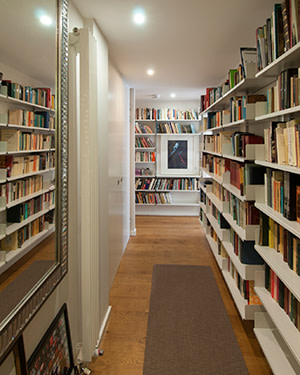Ex-minister Chris Smith’s advice to UK Labour leader Jeremy Corbyn

Simply sign up to the Life & Arts myFT Digest -- delivered directly to your inbox.
For William Wordsworth, poetry was “the spontaneous overflow of powerful feelings”. Yet in his preface to the 1800 edition of Lyrical Ballads — missing from the first edition published in 1798 — Wordsworth was careful to qualify that poems should reflect “emotion recollected in tranquillity”. The poet distils the passion of the event, but in a more considered, meaningful way.
Politics, for Chris Smith, Baron Smith of Finsbury, and former UK culture secretary under prime minister Tony Blair, shares a similar space. “Politics and government,” he says, as we tour his two-bedroom flat in trendy Clerkenwell, central London, “are always going to be a compromise of adjusting ideas to reality; you’re never going to achieve everything you want to, but you have to keep the flame of ambition and intention as alive as you possibly can”.
Wordsworth famously recanted his radical youth, rewriting chunks of the earlier 1805 edition of his great epic work, “The Prelude”, in a more reactionary cast in 1850. Smith, who did his PhD on Wordsworth and fellow Romantic poet Samuel Taylor Coleridge, resists the tempting parallels with his younger, lefty self. “No, no, no,” he says now, unconsciously echoing former prime minister Margaret Thatcher, not known for her left-leaning tendencies.

Yet for all his talk of seeking the middle ground, it is clear who Smith is talking about. When we meet, leftwing MP Jeremy Corbyn is drawing headlines as the leader of the UK’s Labour party. They are friends and colleagues of longstanding. Corbyn has been MP for Islington North since 1983, while Smith was MP for Islington South and Finsbury for 22 years until 2005.
“The wonderful thing about Jeremy is that he is incredibly principled,” says Smith, “and that is something I really admire about him.”
Yet — and this is where the message is clear — “if he’s ever going to become prime minister, he needs to learn about how to apply principles to reality”.

Smith, 64, remains a committed Europhile. “I hope he will end up doing the right thing on things like Europe and Nato,” he says. “But I think the party now has to come to terms with the fact that a change has happened and we need to embrace that change.”
More than just a change, he adds, “this was a popular revolution in the party”. With that in mind, as we head towards the study, filing past shelves upon shelves holding Smith’s 5,000-strong book collection, can we expect to see Corbyn accepting the keys to No 10 Downing Street from a grateful nation?
“I certainly think there’s a possibility, yes,” says Smith, in what amounts to a distinctly non-ringing endorsement.

Smith moved into the flat two years ago, after the break-up of his 24-year relationship with former partner, Dorian Jabri (they share custody of the dog). The flat is a tasteful tumble of wooden floors, muted browns and soft ochres. An Eames chair sits close to a small balcony overlooking the street. While he is new to the area, the flat is full of memories of their time together; Smith’s conversation is punctuated with many comments that start “we liked” and “we used to go there”.
I ask about a plaster bust. “We found it in an antiques market in Italy. We used to go every summer with a group of friends, and stay for a couple of weeks in Tuscany or Umbria. It’s a copy of a bust in the Bargello [National Museum] in Florence, and it’s very beautiful and incredibly serene.”
The study reveals clues to Smith’s character. Books compete with documents for space, but it is all highly organised. “I work on the heap system of filing,” he readily admits. “I’m at my happiest when surrounded by paper that I’m working through.”
Fittingly, political biographies predominate. Smith talks of one in particular, No Ordinary Time by Doris Kearns Goodwin, a biography of Franklin and Eleanor Roosevelt. Again, the message for Corbyn, and other political leaders, is clear. “The point about politics being an accommodation of ideals and reality comes through very strongly,” says Smith, flicking through the pages. “If you had to choose a politician from the 20th century whom you could say achieved a tremendous amount in a progressive direction, with the possible exception of [Clement] Attlee, it would be Franklin Roosevelt. And yet when you read what was happening through the course of his presidency, it was all about making deals, fudging, compromising and getting half the loaf because that was all he was going to get.”
Got it, Jeremy?
Yet ironically, part of Corbyn’s appeal, Smith says as we linger over a painting of his Tibetan terrier, Jinny, is that he is such an anti-politician — ironically, because Smith is the ultimate insider. Questions are expertly parried. Answers, when not oblique instructions for incoming party leaders, are measured, quiet and ruminative. Smith plays careful and safe, aiming for consensus rather than confrontation.

Yet he does have teeth. Smith was mauled by the tabloids — the Daily Mail in particular — for what they saw as his mishandling of the flooding crisis last year in his position as chairman of the Environment Agency. A spat with Eric Pickles, the government’s communities secretary, provoked a strident fightback from Smith. “What really enraged me at the time was that [Pickles] and especially some of the newspapers were making direct criticisms of the staff of the Environment Agency who had been absolutely working their socks off,” he says, visibly bristling still more than 18 months later. “I was not having that and I stood up and said so.”
Yet amid all the vitriol — Smith was accused variously of having wellies that were too clean; of spending a night at the theatre at the height of the flooding; and, simply, of “rank incompetence” — he refuses to accuse the newspapers of out-and-out homophobia. When he came out in 1984, Smith was one of the first publicly out MPs.

We were talking achievements — Smith rates the free entry to galleries and museums among his greatest triumphs — when it struck me that he has probably made the most impact by just being Chris Smith, an openly gay man at the highest level of government.
“I’d been first elected to parliament in 1983 and had decided even before I got there that at some stage I ought to say something publicly about my sexual orientation,” he says.
Why? I counter. The 1980s was a dangerous decade for gays and lesbians. Gay newspaper offices were firebombed; the human rights activist Peter Tatchell had lost the Bermondsey by-election a few months earlier in a campaign riddled with homophobia; and the tabloids gleefully labelled Aids as the “gay plague”.
Smith shrugs. I suspect he has told this story more than once over the course of his career. “Partly because I saw some of my parliamentary colleagues being followed and hounded by the press; their every move was being watched and they were subject to all sorts of harassment. And partly because ultimately it’s right that you should be as open as possible.”

It is a quality that will hold him in good stead as he embarks upon perhaps the last great project of his career: as master of Pembroke College, Smith’s old Cambridge college. He is careful, however, to deny it is a retirement job. “I wouldn’t want to describe it as such. It’s probably the last major job that I will do, but I certainly don’t see it as a running-down process.”
However, he is slowing down, if very gradually. Criticised in the past for being a “quango king”, his role as head of the Task Force on Shale Gas comes to an end this month, his chairmanship of the Wordsworth Trust winds down in 2017, as does his similar position as head of the Advertising Standards Agency. “Pembroke will come to the fore,” says Smith.
Perhaps freeing him to write “the big Wordsworth book” that his friend Rabbi Julia Neuberger says Smith must one day produce. “Perhaps when I’m more able to draw breath,” he says with a smile. “There are still books to be written, causes to fight for, mountains to be climbed, journeys to be gone on — there is still a lot to do with life.”
Hugo Greenhalgh is the FT’s wealth correspondent
Photographs by Michael Harding
Comments